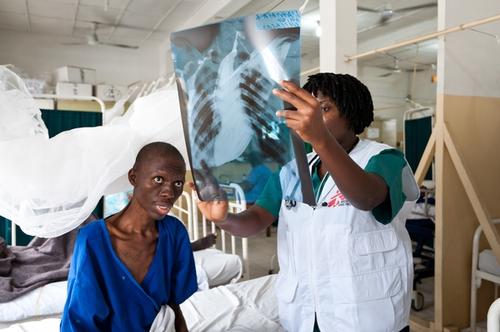During a francophone conference on HIV currently being held in France, MSF highlights the delay in the fight against the disease in French-speaking African countries and calls for them to adopt strategies that have proven to be highly effective
Montpellier, 28 April 2014 – As the International Francophone conference on HIV and Hepatitis (AFRAVIH) takes place in Montpellier from 27 to 30 April, the international humanitarian medical organization Médecins Sans Frontières (MSF) expresses concern about the lack of significant progress in the fight against HIV / AIDS in several countries of Central and West Africa. In these countries, despite relatively low prevalence of the disease (often less than 5%), only 20 % of people living with HIV and in need of antiretroviral treatment (ART) actually receive it. Many of them then die before being diagnosed.
“When we see the situation in countries like the Democratic Republic of Congo, Guinea or the Central African Republic we feel like we are stuck in a time wrap”, says Dr. Eric Goemaere, MSF AIDS specialist. “In our projects, we receive patients at advanced stages of AIDS who remind us what we saw before 2000 in Southern Africa, when antiretroviral treatments were hardly available."
Southern African countries, where the prevalence of HIV is much higher than in West and Central Africa, have made enormous progress in the past fifteen years. This is the result of a combination of strong political will, backed by the provision of substantial financial resources, and the ability to adopt innovative operational approaches to improve the quality of HIV treatment programs and increase the number of people on treatment. Today, these elements are sorely lacking in many francophone countries in Central and West Africa.
"Countries in the region should radically reconsider their models of treatment and care. Current approaches are centralized and doctor-centered, thus excluding many patients and making it impossible to control the transmission of the disease in the community”, says Dr Suna Balkan, coordinator of the MSF HIV Working Group. “Experience has shown that providing ART closer to the patient and shifting tasks from doctors to nurses and properly trained lay workers gives very good results. Moreover it reduces the workload of doctors and nurses, who can then focus on the most severely ill patients."
At the AFRAVIH conference, the epidemiological branch of MSF Epicentre will present the results of a study conducted in 2013 in Chiradzulu, Malawi. In this district, where MSF and the Ministry of Health provide care to more than 28 000 patients, ART coverage reaches 66 % of the HIV-positive population, and 91% of patients on ART have undetectable viral load. This means that the patients follow their treatment correctly and that the risk that they will transmit the virus is extremely limited.
The study also found a very low level of new infections, or incidence, as low as 0.4%. This demonstrates that it is possible to reduce the rate of HIV transmission in an area where prevalence is high (17%), notably through a good access to screening and treatment and excellent retention in care.
These results confirm the effectiveness of strategies that MSF and the Ministry of Health have been implementing in the district of Chiradzulu and in other projects in the region: early detection, task shifting to less qualified staff, initiation of ART treatment by nurses, bringing follow-up closer to patients’ homes, regular supervision, and counseling by non-medical personnel and/or other patients. This enabled the scaling-up of the number of people receiving ART without reducing the quality of care."It is not about cutting-and-pasting premade formulas into countries of Central and West Africa, as the contexts and the prevalence differ. What matters is to emulate strategies that have shown to be effective”, said Dr. Mit Philips, MSF Health policies advisor. “We also need an increased financial and political effort by governments, donors and international health providers. If the screening and treatment of HIV is not free, closer and more accessible to patients, we will be not be able to provide care and meet the needs of the 2-3 million patients in Central and West Africa waiting to receive treatment."



